Pixel-Level Spatiotemporal Analyses of Vegetation Fractional Coverage Variation and Its Influential Factors in a Desert Steppe: A Case Study in Inner Mongolia, China
Abstract
:1. Introduction
2. Materials and Methods
2.1. Study Area
2.2. Data Sources and Processing Methods
2.3. Research Methods
2.3.1. Spatiotemporal Variation of VFC
2.3.2. Correlation Analyses between VFC and Its Influential Factors
2.3.3. Dominant Factor Identification of VFC
3. Results and Discussion
3.1. Spatiotemporal Variation of VFC
3.2. Correlation Analysis of the VFC and Its Influential Factors
3.2.1. Precipitation
3.2.2. Temperature
3.2.3. Groundwater
3.2.4. Available Water Content of Soil
3.2.5. Livestock Density
3.3. Spatiotemporal Analyses of the Dominant Factors
4. Conclusions
Acknowledgments
Author Contributions
Conflicts of Interest
References
- Schlesinger, W.H.; Reynolds, J.F.; Cunningham, G.L.; Huenneke, L.F.; Jarrell, W.M.; Virginia, R.A.; Whitford, W.G. Biological feedbacks in global desertification. Science 1990, 247, 1043–1048. [Google Scholar] [CrossRef] [PubMed]
- Zhan, X.; Li, L.; Cheng, W. Restoration of Stipa kryloviisteppes in Inner Mongolia of China: Assesment of seed banks and vegetation composition. J. Arid Environ. 2007, 68, 298–307. [Google Scholar] [CrossRef]
- Fang, J.; Bai, Y.; Li, L.; Jiang, G.; Huang, J.; Huang, Z.; Zhang, W.; Gao, S. Scientific basis and practical ways for sustainable development of China’s pasture regions. Chin. Sci. Bull. 2016, 61, 155–164. (In Chinese) [Google Scholar]
- Liao, G. Grassland Resource of China; Chinese Science and Technology Publisher: Beijing, China, 1996. (In Chinese) [Google Scholar]
- Yang, X.; Xu, B.; Jin, Y.; Qin, Z.; Ma, H.; Li, J.; Zhao, F.; Chen, S.; Zhu, X. Remote sensing monitoring of grassland vegetation growth in the Beijing–Tianjin sandstorm source project area from 2000 to 2010. Ecol. Indic. 2015, 51, 244–251. [Google Scholar] [CrossRef]
- Noy-Meir, I. Desert ecosystems: Environment and producers. Ann. Rev. Ecol. Syst. 1973, 4, 25–52. [Google Scholar] [CrossRef]
- Bailey, H.P. Semi-Arid Climates: Their Definition and Distribution. Agric. Semi-Arid Environ. 1979, 34, 73–97. [Google Scholar]
- Cable, J.; Huxman, T. Precipitation pulse size effects on Sonoran Desert soil microbial crusts. Oecologia 2004, 141, 317–324. [Google Scholar] [CrossRef] [PubMed]
- Jung, M.; Reichstein, M.; Ciais, P.; Seneviratne, S.I.; Sheffield, J.; Goulden, M.L.; Bonan, G.; Cescatti, A.; Chen, J.; de Jeu, R.; et al. Recent decline in the global land evapotranspiration trend due to limited moisture supply. Nature 2010, 467, 951–954. [Google Scholar] [CrossRef] [PubMed]
- Armstrong, R.; Pomeroy, J.; Martz, L. Variability in evaporation across the Canadian Prairie region during drought and non-drought periods. J. Hydrol. 2015, 521, 182–195. [Google Scholar] [CrossRef]
- Bittellia, M.; Ventura, F.; Campbell, G.S.; Snyder, R.L.; Gallegati, F.; Pisa, P.R. Coupling of heat, water vapor, and liquid water fluxes to compute evaporation in bare soils. J. Hydrol. 2008, 362, 191–205. [Google Scholar] [CrossRef]
- Li, F.; Zhao, W.; Liu, H. The Response of Aboveground Net Primary Productivity of Desert Vegetation to Rainfall Pulse in the Temperate Desert Region of Northwest China. PLoS ONE 2013, 8, e73003. [Google Scholar] [CrossRef] [PubMed]
- Chu, C.; Havstad, K.; Kaplan, N.; Lauenroth, W.; McClaran, M.; Peters, D.; Vermeire, L.; Adler, P.; Rapson, G. Life form influences survivorship patterns for 109 herbaceous perennials from six semi-arid ecosystems. J. Veg. Sci. 2014, 25, 947–954. [Google Scholar] [CrossRef]
- Jiang, W.; Guo, Z.; Sun, X.; Wu, H.; Chu, G.; Yuan, B.; Hatté, C.; Guiot, J. Reconstruction of climate and vegetation changes of Lake Bayanchagan (Inner Mongolia): Holocene variability of the East Asian monsoon. Quat. Res. 2006, 65, 411–420. [Google Scholar] [CrossRef]
- Feng, Q.; Ma, H.; Jiang, X.; Wang, X.; Cao, S. What Has Caused Desertification in China? Sci. Rep. UK 2015. [Google Scholar] [CrossRef] [PubMed]
- Zhu, G.; Deng, L.; Zhang, X.; Shangguan, Z. Effects of grazing exclusion on plant community and soil physicochemical properties in a desert steppe on the Loess Plateau, China. Ecol. Eng. 2016, 90, 372–381. [Google Scholar] [CrossRef]
- Runnström, M.C. Is Northern China Winning the Battle against Desertification? AMBIO J. Hum. Environ. 2009, 29, 468–476. [Google Scholar] [CrossRef]
- Cao, S. Impact of China’s Large-Scale Ecological Restoration Program on the Environment and Society in Arid and Semiarid Areas of China: Achievements, Problems, Synthesis, and Applications. Crit. Rev. Environ. Sci. Techonol. 2011, 41, 317–335. [Google Scholar] [CrossRef]
- Carlson, T.; Ripley, D. On the relation between NDVI, fractional vegetation cover, and leaf area index. Remote Sens. Environ. 1997, 62, 241–252. [Google Scholar] [CrossRef]
- Sellers, P.J.; Tucker, C.J.; Collatz, G.J.; Los, S.O.; Justice, C.O.; Dazlich, D.A.; Randall, D.A. A global 1° by 1° NDVI data set for climate studies. Part 2: The generation of global fields of terrestrial biophysical parameters from the NDVI. Int. J. Remote Sens. 1994, 15, 3519–3545. [Google Scholar] [CrossRef]
- Valor, E.; Caselles, V. Mapping land surface emissivity from NDVI: Application to European, African, and South American areas. Remote Sens. Environ. 1996, 57, 167–184. [Google Scholar] [CrossRef]
- Eckert, S.; Hüsler, F.; Liniger, H.; Hodel, E. Trend analysis of MODIS NDVI time series for detecting land degradation and regeneration in Mongolia. J. Arid Environ. 2015, 113, 16–28. [Google Scholar] [CrossRef]
- Cai, D.; Fraedrich, K.; Sielmann, F.; Guan, Y.; Guo, S.; Zhang, L.; Zhu, X. Climate and Vegetation: An ERA-Interim and GIMMS NDVI Analysis. J. Clim. 2014, 27, 5111–5118. [Google Scholar] [CrossRef]
- Cai, D.; Fraedrich, K.; Sielmann, F.; Zhang, L.; Zhu, X.; Guo, S.; Guan, Y. Vegetation Dynamics on the Tietan Plateau (1982–2006): An Attribution by Ecohydrological Diagnostics. J. Clim. 2015, 28, 4576–4584. [Google Scholar] [CrossRef]
- Detsch, F.; Otte, I.; Appelhans, T.; Hemp, A.; Nauss, T. Seasonal and long-term vegetation dynamics from 1-km GIMMS-based NDVI times series at Mt. Kilimanjaro, Tanzania. Remote Sen. Environ. 2016, 178, 70–83. [Google Scholar] [CrossRef]
- Green, S.; Cawkwell, F.; Dwyer, E. Cattle stocking rates estimated in temperate intensive grasslands with a spring growth model derived from MODIS NDVI time-series. Int. J. Appl. Earth Obs. Geoinf. 2016, 52, 166–174. [Google Scholar] [CrossRef]
- Pettorelli, N.; Vik, J.; Mysterud, A.; Gaillard, J.; Tucker, C.; Stenseth, N. Using the satellite-derived NDVI to assess ecological responses to environmental change. Trends Ecol. Evol. 2005, 20, 503–510. [Google Scholar] [CrossRef] [PubMed]
- Sen, I. AVHRR-NDVI-based crop coefficients for analyzing long-term trends in evapotranspiration in relation to changing climate in the U.S. High Plains. Water Resour. Res. 2013, 49, 231–244. [Google Scholar]
- Tucker, C.J.; Pinzon, J.E.; Brown, M.E.; Slayback, D.A.; Pak, E.W.; Mahoney, R.; Vermote, E.F.; Saleous, N.E. An extended AVHRR 8-km NDVI dataset compatible with MODIS and SPOT vegetation NDVI data. Int. J. Remote Sens. 2005, 26, 4485–4498. [Google Scholar] [CrossRef]
- Chen, J.; Jönsson, P.; Tamura, M.; Gu, Z.; Matsushita, B.; Eklundh, L. A simple method for reconstructing a high-quality NDVI time-series data set based on the Savitzky–Golay filter. Remote Sens. Environ. 2004, 91, 332–344. [Google Scholar] [CrossRef]
- Tian, F.; Fensholt, R.; Verbesselt, J.; Grogan, K.; Horion, S.; Wang, Y. Evaluating temporal consistency of long-term global NDVI datasets for trend analysis. Remote Sens. Environ. 2015, 163, 326–340. [Google Scholar] [CrossRef]
- Defries, R.S.; Townshend, J.R.G. NDVI-derived land cover classifications at a global scale. Int. J. Remote Sens. 1994, 15, 3567–3586. [Google Scholar] [CrossRef]
- Park, J.; Ahn, S.; Hwang, S.; Jang, C.; Park, G.; Kim, S. Evaluation of MODIS NDVI and LST for indicating soil moisture of forest areas based on SWAT modeling. Paddy Water Environ. 2014, 12, 77–88. [Google Scholar] [CrossRef]
- Liu, X.; Chen, B. Climatic warming in the Tibetan plateau during recent decades. Int. J. Climatol. 2000, 20, 1729–1742. [Google Scholar] [CrossRef]
- Royden, L.; Burchfiel, B.; van der Hilst, R.D. The geological evolution of the Tibetan Plateau. Science 2008, 321, 1054–1058. [Google Scholar] [CrossRef] [PubMed]
- Gao, Y.; Li, X.; Leung, L.; Chen, D.; Xu, J. Aridity changes in the Tibetan Plateau in a warming climate. Environ. Res. Lett. 2015, 10, 34013–34024. [Google Scholar] [CrossRef]
- An, Z.; Kukla, G.; Porter, S.; Xiao, J. Magnetic susceptibility evidence of monsoon variation on the Loess Plateau of central China during the last 130,000 years. Quat. Res. 1991, 36, 29–36. [Google Scholar] [CrossRef]
- Fu, B.; Chen, L.; Ma, K.; Zhou, H.; Wang, J. The relationships between land use and soil conditions in the hilly area of the loess plateau in northern Shaanxi, China. Catena 2000, 39, 69–78. [Google Scholar] [CrossRef]
- Boegman, L.; Ivey, G.; Imberger, J. Modeling soil–water dynamics and soil–water carrying capacity for vegetation on the Loess Plateau, China. Agric. Water Manag. 2015, 159, 176–184. [Google Scholar]
- He, H. China gauging station network. Adv. Water Sci. 2010, 21, 460–465. [Google Scholar]
- Mujumdar, P.; Sasikumar, K. A fuzzy risk approach for seasonal water quality management of a river system. Water Resour. Res. 2002, 38. [Google Scholar] [CrossRef]
- Wang, F.; Liang, R.; Yang, X.; Chen, M. A study of ecological water requirements in northwest China I: Theoretical analysis. J. Nat. Resour. 2002, 17, 1–8. (In Chinese) [Google Scholar]
- Schaffrath, D.; Barthold, F.; Bernhofer, C.; Milchunas, D.; Lauenroth, W.; Chapman, P.; Kazempour, M. Effects of grazing, topography, and precipitation on the structure of a semiarid grassland. Plant Ecol. 1989, 80, 11–23. [Google Scholar]
- Le, H.; Bingham, R.; Skerbek, W. Relationship between the variability of primary production and the variability of annual precipitation in world arid lands. J. Arid Environ. 1988, 1–18. [Google Scholar] [CrossRef]
- Zhou, J.; Fu, B.; Gao, G.; Lü, Y.; Liu, Y.; Lü, N.; Wang, S. Effects of precipitation and restoration vegetation on soil erosion in a semi-arid environment in the Loess Plateau, China. Catena 2016, 137, 1–11. [Google Scholar] [CrossRef]
- Piao, S.; Mohammat, A.; Fang, J.; Cai, Q.; Feng, J. NDVI-based increase in growth of temperate grasslands and its responses to climate changes in China. Glob. Environ. Chang. 2006, 16, 340–348. [Google Scholar] [CrossRef]
- Xu, W.; Gu, S.; Zhao, X.; Xiao, J.; Tang, Y.; Fang, J.; Zhang, J.; Jiang, S. High positive correlation between soil temperature and NDVI from 1982 to 2006 in alpine meadow of the Three-River Source Region on the Qinghai-Tibetan Plateau. Int. J. Appl. Earth Obs. Geoinform. 2011, 13, 528–535. [Google Scholar] [CrossRef]
- Lei, L.; Tashpolat, T.; Li, J.; Zhang, F.; Tian, Y. Correlation between Land Surface Temperature and Vegetation Coverage in a Typical Arid Oasis. J. Desert Res. 2011, 31, 1001–1007. (In Chinese) [Google Scholar]
- Kizito, F.; Dragila, M.; Sène, M.; Lufafa, A.; Diedhiou, I.; Dick, R.; Selker, J.; Dossa, E.; Khouma, M.; Badiane, A.; et al. Seasonal soil water variation and root patterns between two semi-arid shrubs co-existing with Pearl millet in Senegal, West Africa. J. Arid Environ. 2006, 67, 436–455. [Google Scholar] [CrossRef]
- Jacobsen, A.; Pratt, R.; Davis, S.; Ewers, F. Cavitation resistance and seasonal hydraulics differ among three arid Californian plant communities. Plant Cell Environ. 2007, 30, 1599–1609. [Google Scholar] [CrossRef] [PubMed]
- Jacobsen, A.; Pratt, B.; Davis, S.; Ewers, F. Comparative community physiology: Nonconvergence in water relations among three semi-arid shrub communities. New Phytol. 2008, 180, 100–113. [Google Scholar] [CrossRef] [PubMed]
- Wang, X.; Wang, Z.; Berndtsson, R.; Zhang, Y.; Pan, Y. Desert shrub stemflow and its significance in soil moisture replenishment. Hydrol. Earth Syst. Sci. 2011, 15, 561–567. [Google Scholar] [CrossRef]
- Cooper, D.J.; Sanderson, J.S.; Stannard, D.I.; Groeneveld, D.P. Effects of long-term water table drawdown on evapotranspiration and vegetation in an arid region phreatophyte community. J. Hydrol. 2006, 325, 21–34. [Google Scholar] [CrossRef]
- Kløve, B.; Ala-Aho, P.; Bertrand, G.; Boukalova, Z.; Ertürk, A.; Goldscheider, N.; Ilmonen, J. Groundwater dependent ecosystems. Part I: Hydroecological status and trends. Environ. Sci. Policy 2011, 14, 770–781. [Google Scholar] [CrossRef]
- Fan, Y. Groudwater in the Earth’s critical zone: Relevance to large-scale patterns and processes. Water Resour. Res. 2015, 51, 3052–3069. [Google Scholar] [CrossRef]
- Ghamarnia, H.; Khodaei, E. Evidence on shallow groundwater use by edible green vegetables such as Solanum pseudoca psicum, Ocimum basilicum and Lepidium sativum in a semi-arid climate condition. Agric. Water Manag. 2016, 165, 198–210. [Google Scholar] [CrossRef]
- Wildung, R.; Garland, T.; Buschbom, R. The interdependent effects of soil temperature and water content on soil respiration rate and plant root decomposition in arid grassland soils. Soil Biol. Biochem. 1975, 7, 373–378. [Google Scholar] [CrossRef]
- Allison, G.; Hughes, M. The use of natural tracers as indicators of soil-water movement in a temperate semi-arid region. J. Hydrol. 1983, 60, 157–173. [Google Scholar] [CrossRef]
- Gómez-Plaza, A.; Martı́Nez-Mena, M.; Albaladejo, J.; Castillo, V. Factors regulating spatial distribution of soil water content in small semiarid catchments. J. Hydrol. 2001, 253, 211–226. [Google Scholar] [CrossRef]
- Pei, S.; Fu, H.; Wan, C. Changes in soil properties and vegetation following exclosure and grazing in degraded Alxa desert steppe of Inner Mongolia, China. Agric. Ecosyst. Environ. 2008, 124, 33–39. [Google Scholar] [CrossRef]
- Rong, Y.; Yuan, F.; Ma, L. Effectiveness of exclosures for restoring soils and vegetation degraded by overgrazing in the Junggar Basin, China. Grassl. Sci. 2014, 60, 118–124. [Google Scholar] [CrossRef]
- Unkovich, M.; Nan, Z. Problems and prospects of grassland agroecosystems in western China. Agric. Ecosyst. Environ. 2008, 124, 1–2. [Google Scholar] [CrossRef]
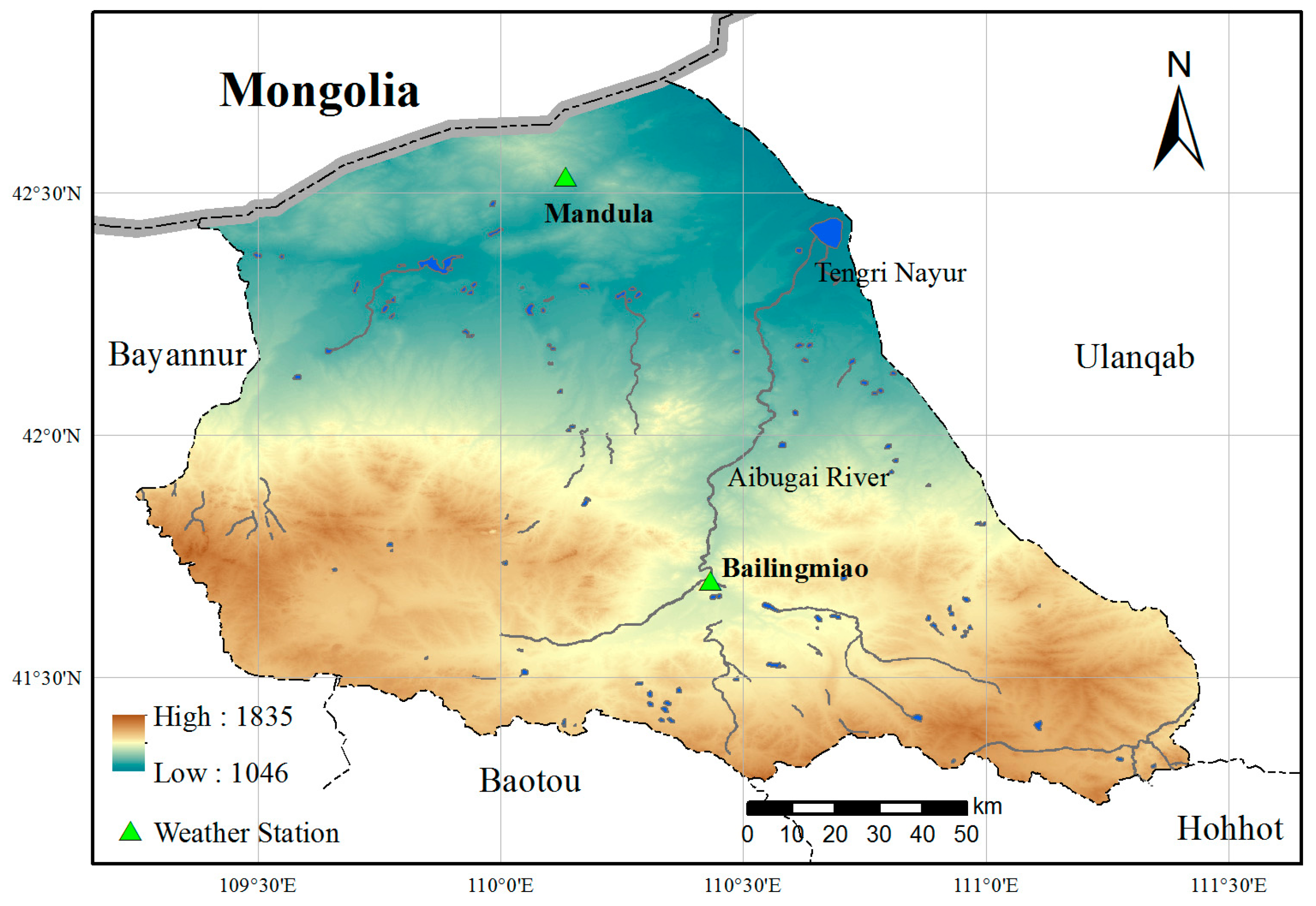
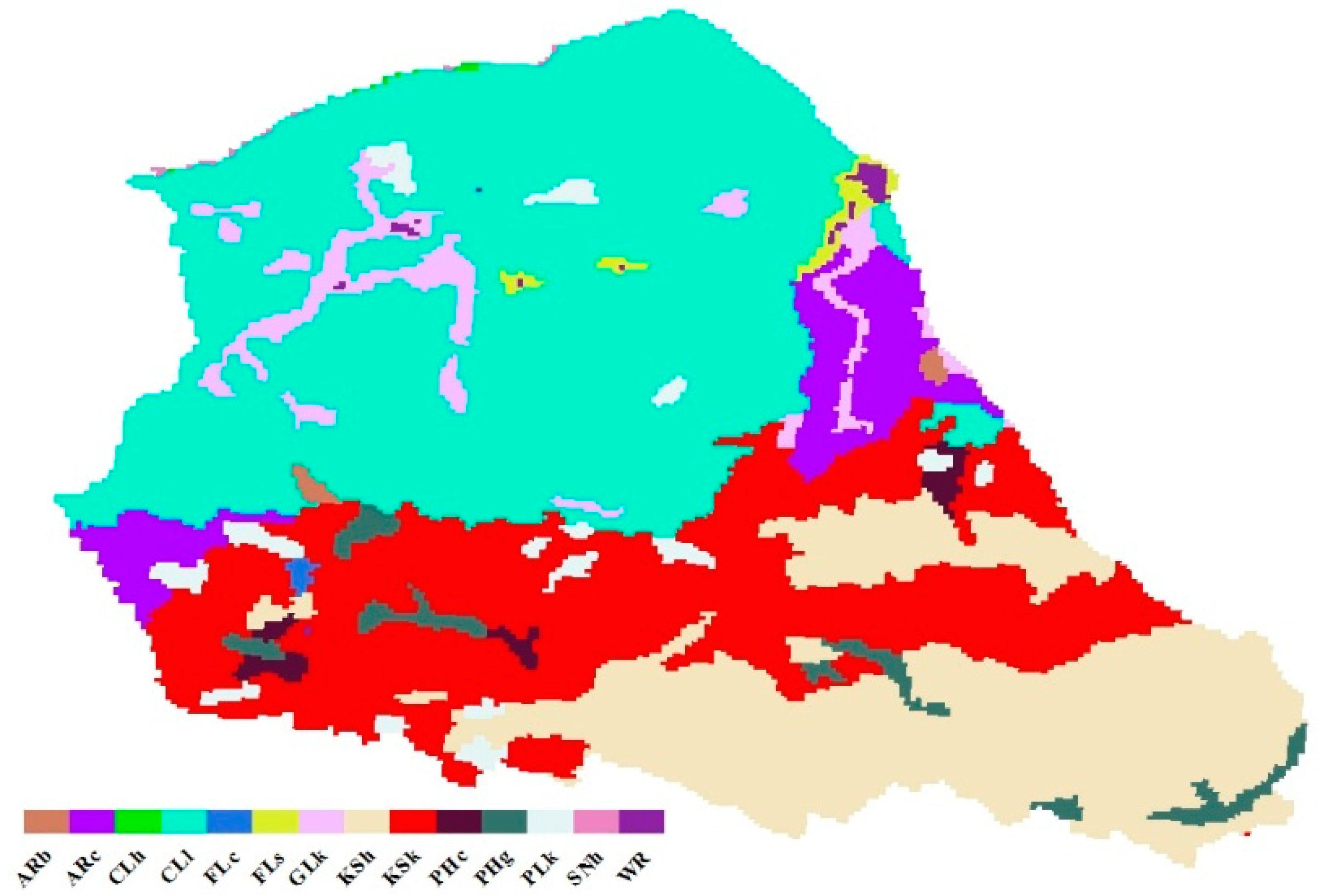
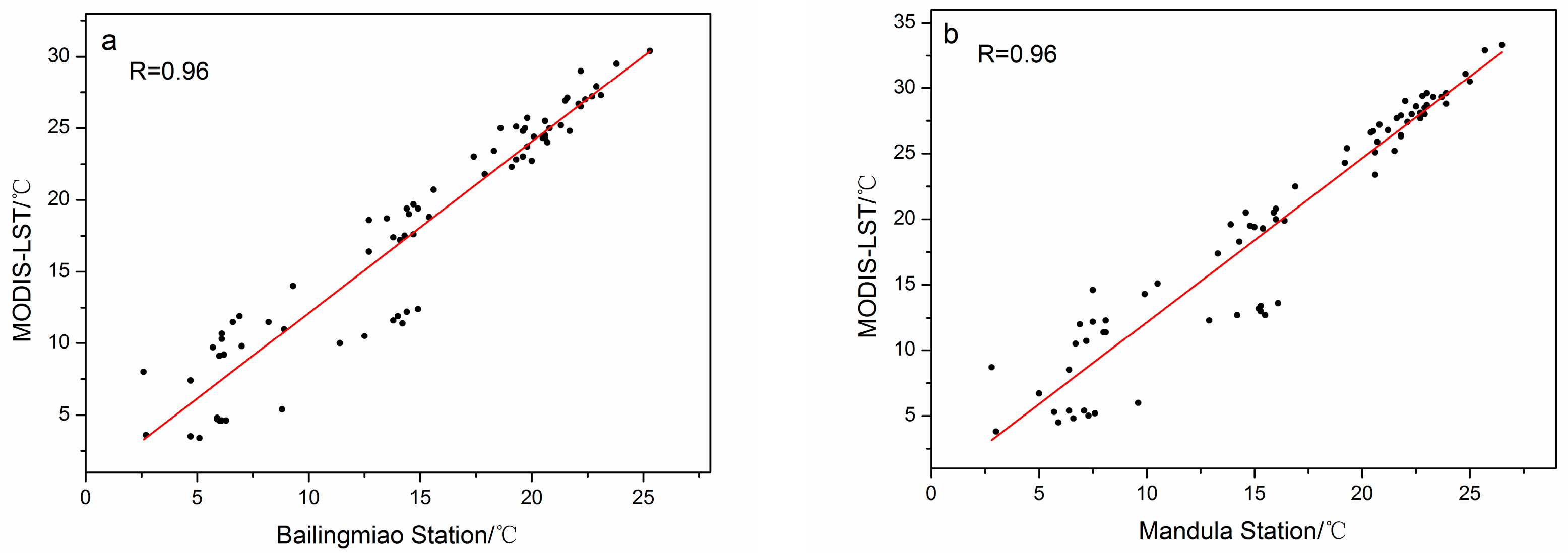
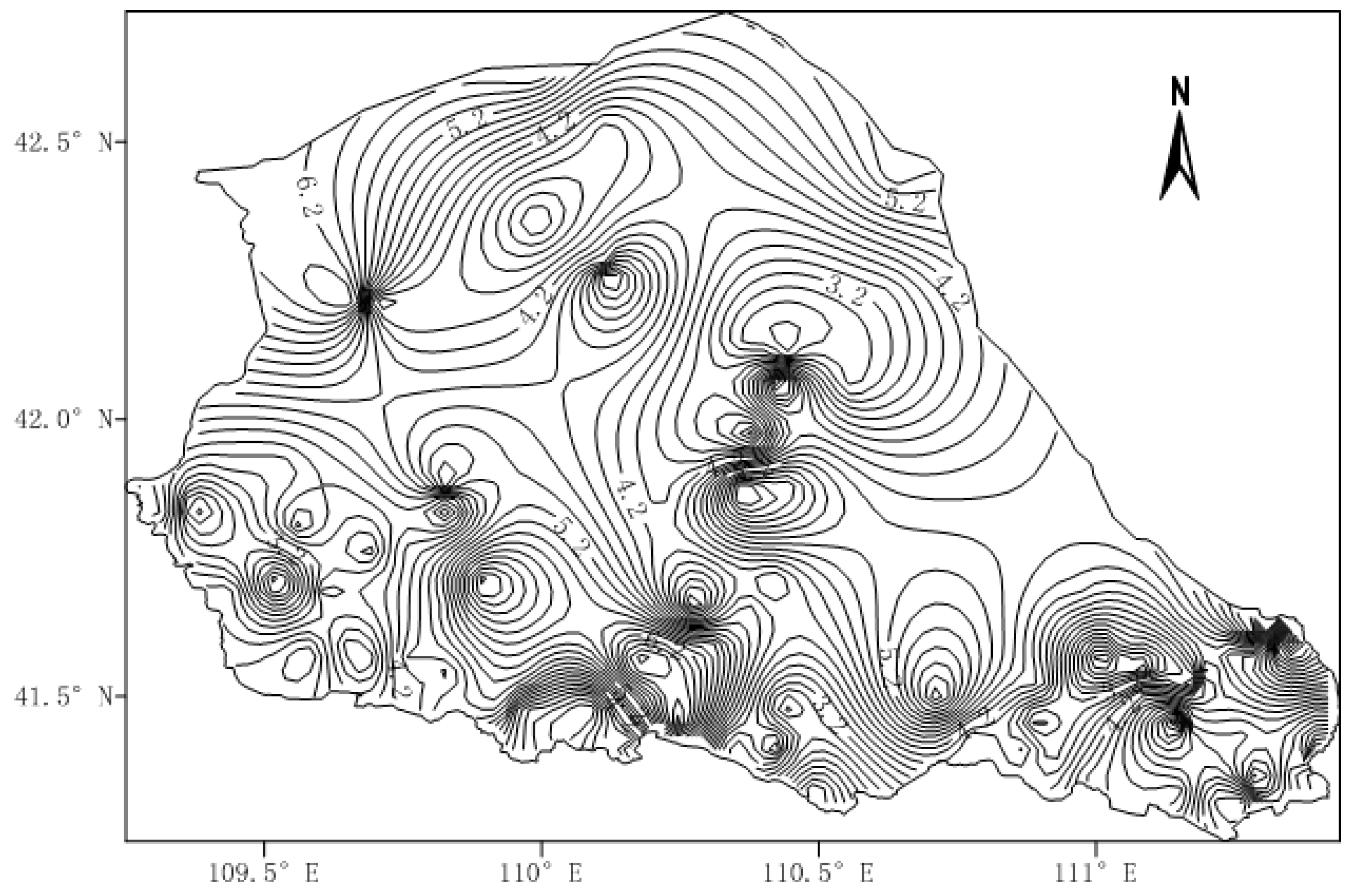
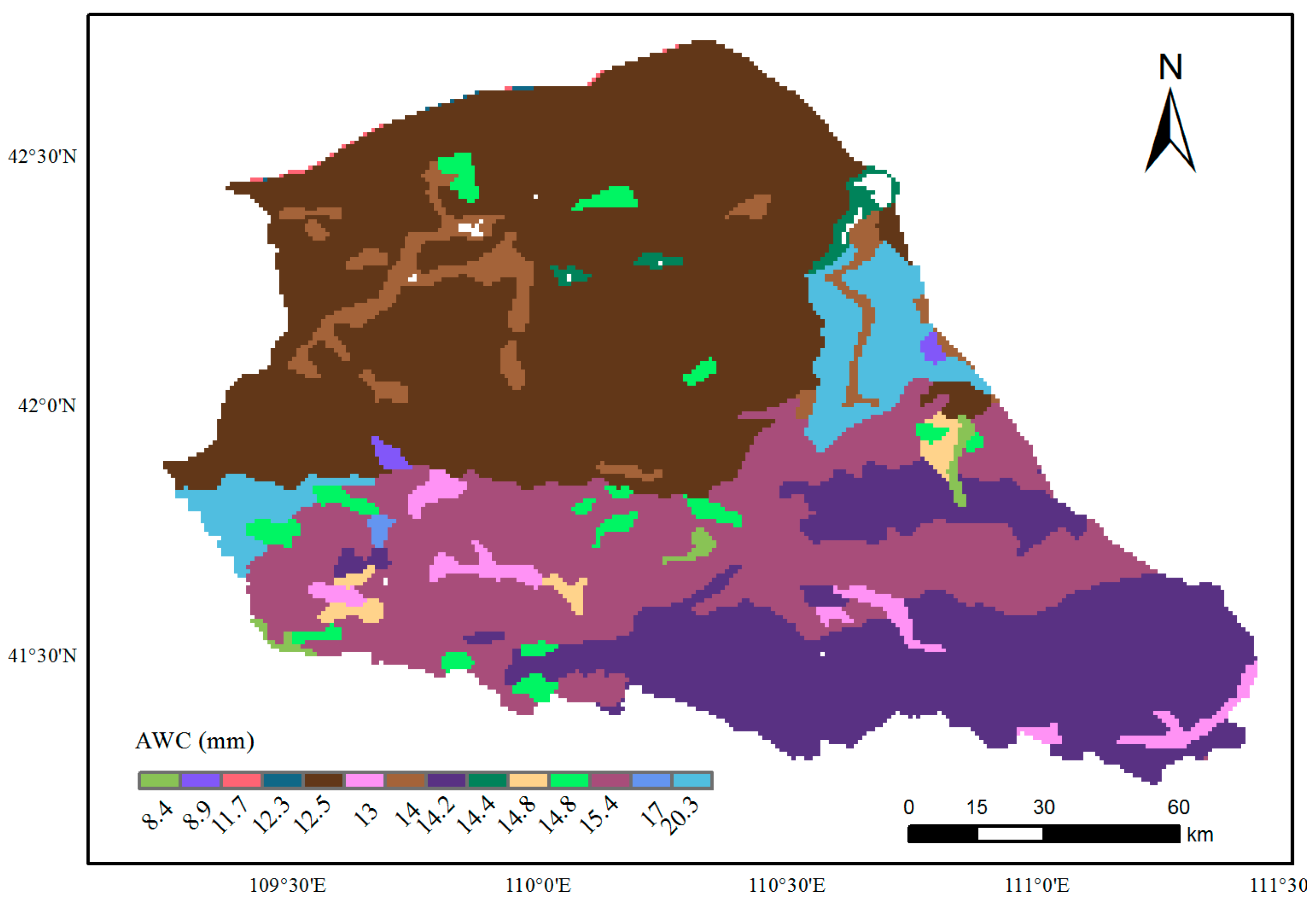
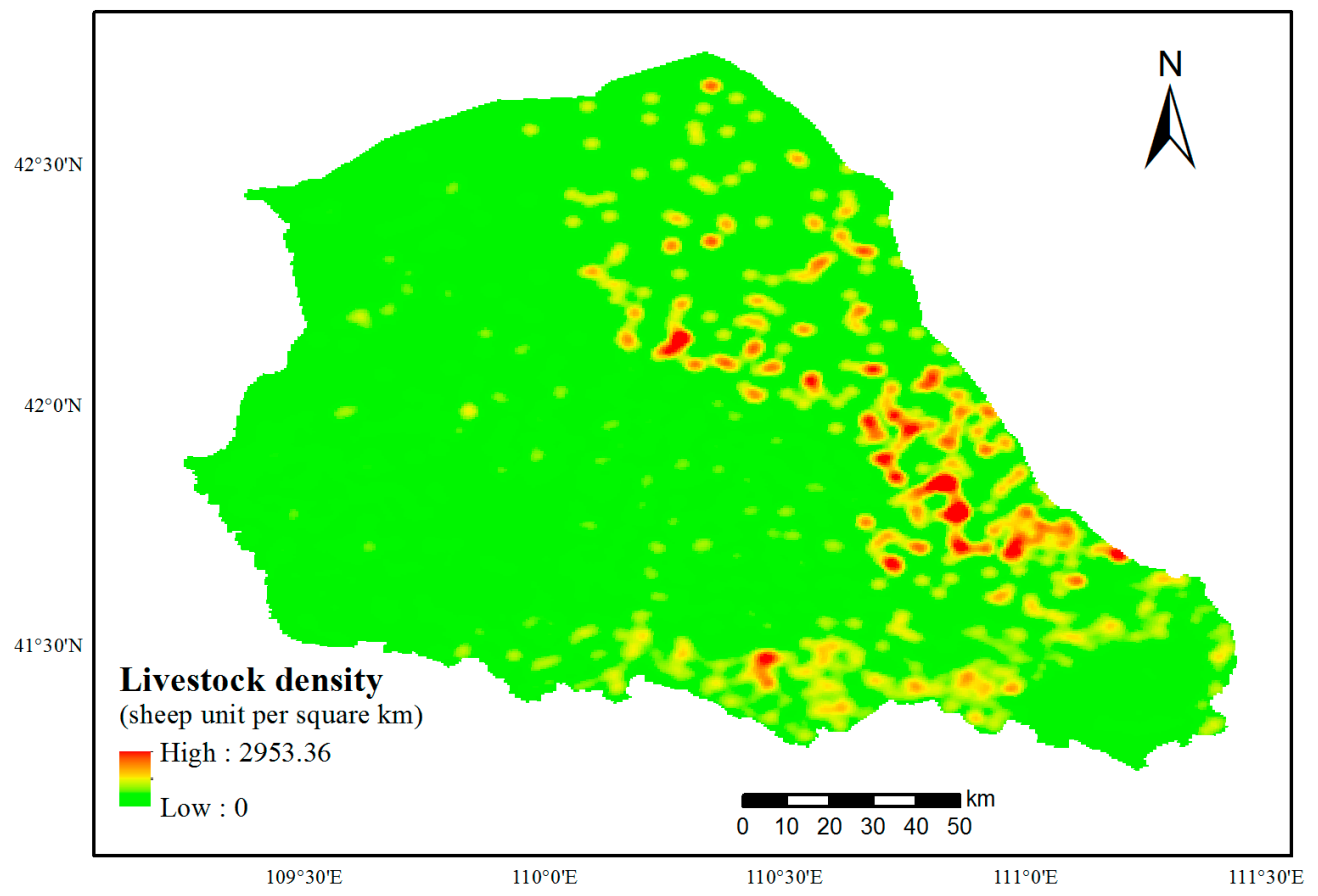
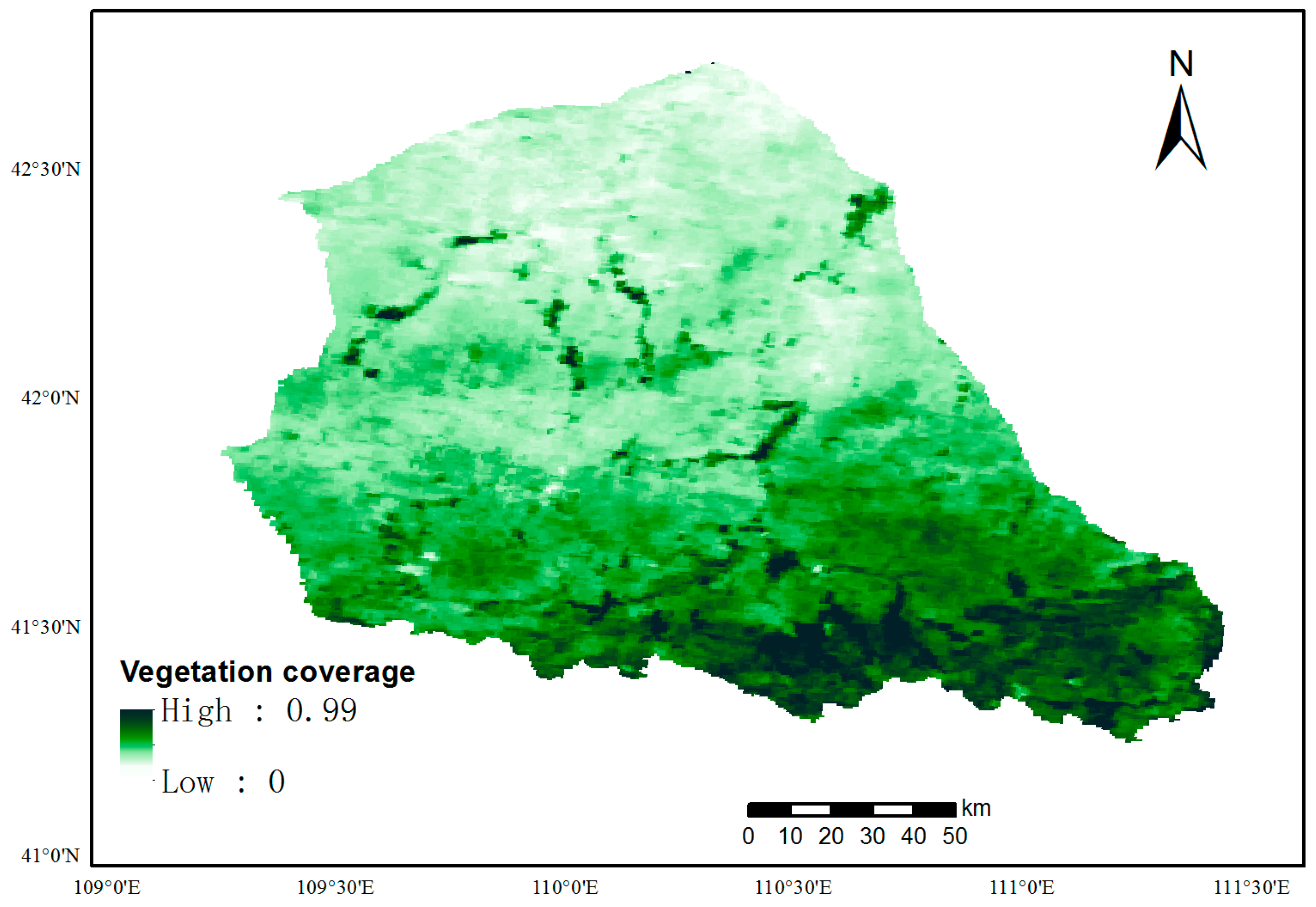
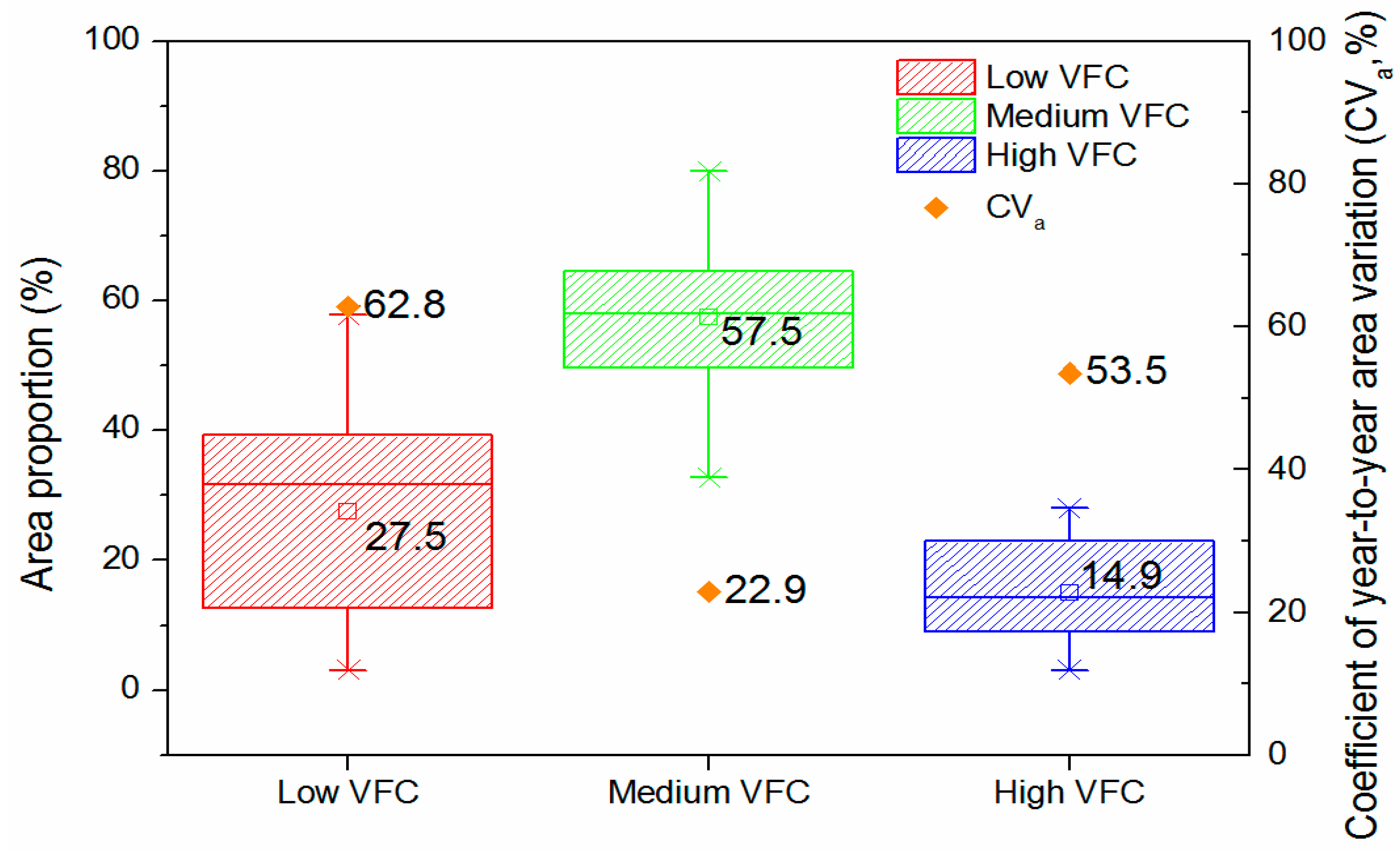
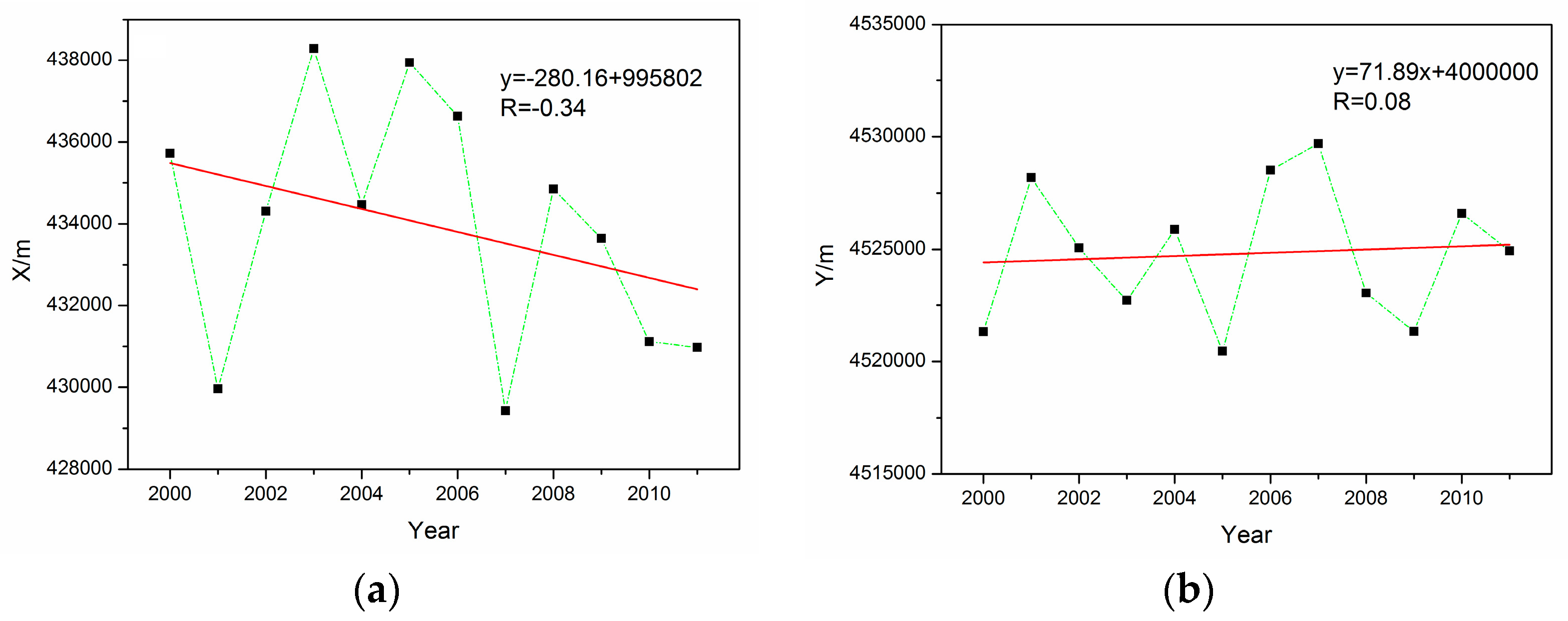
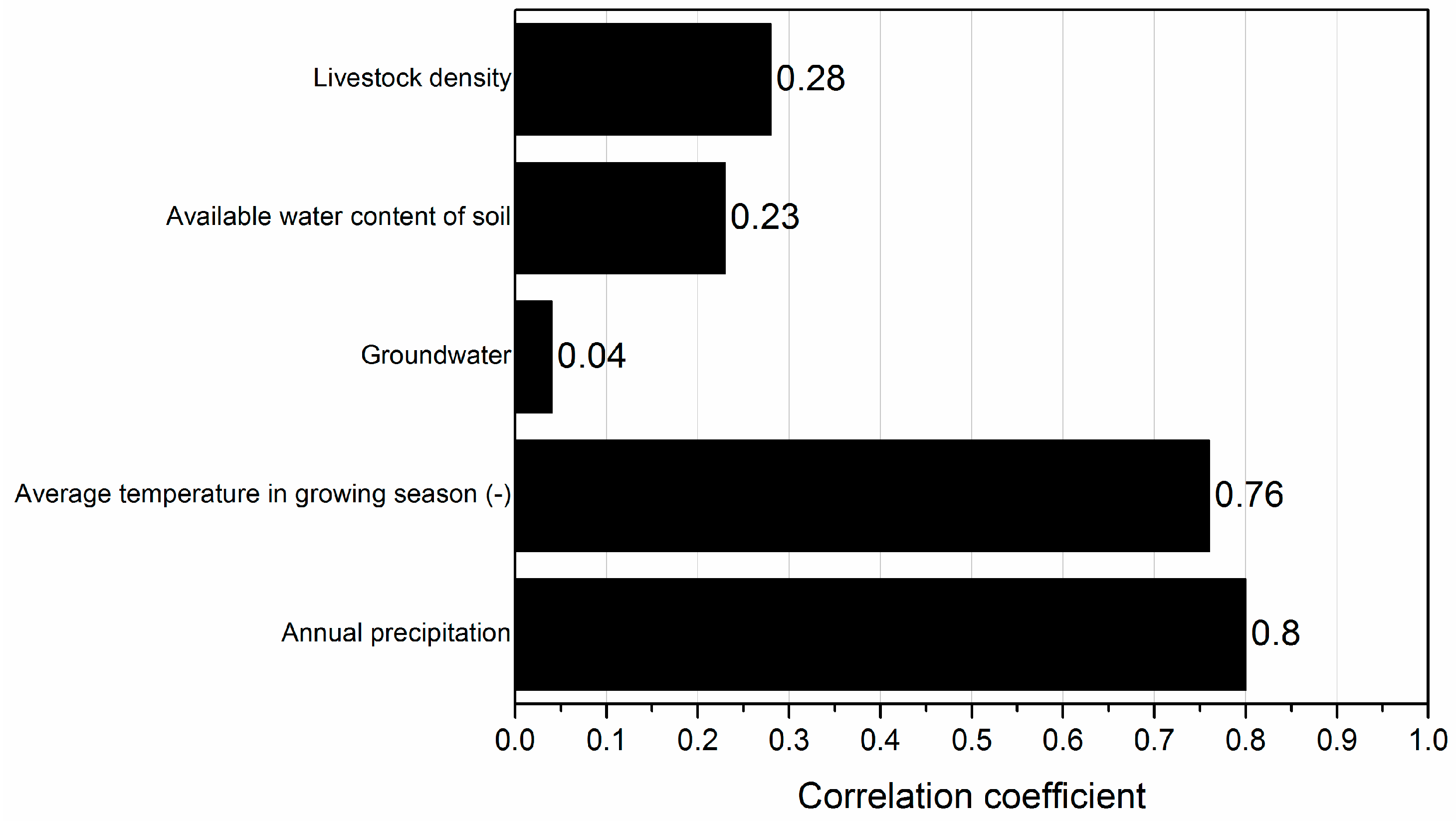
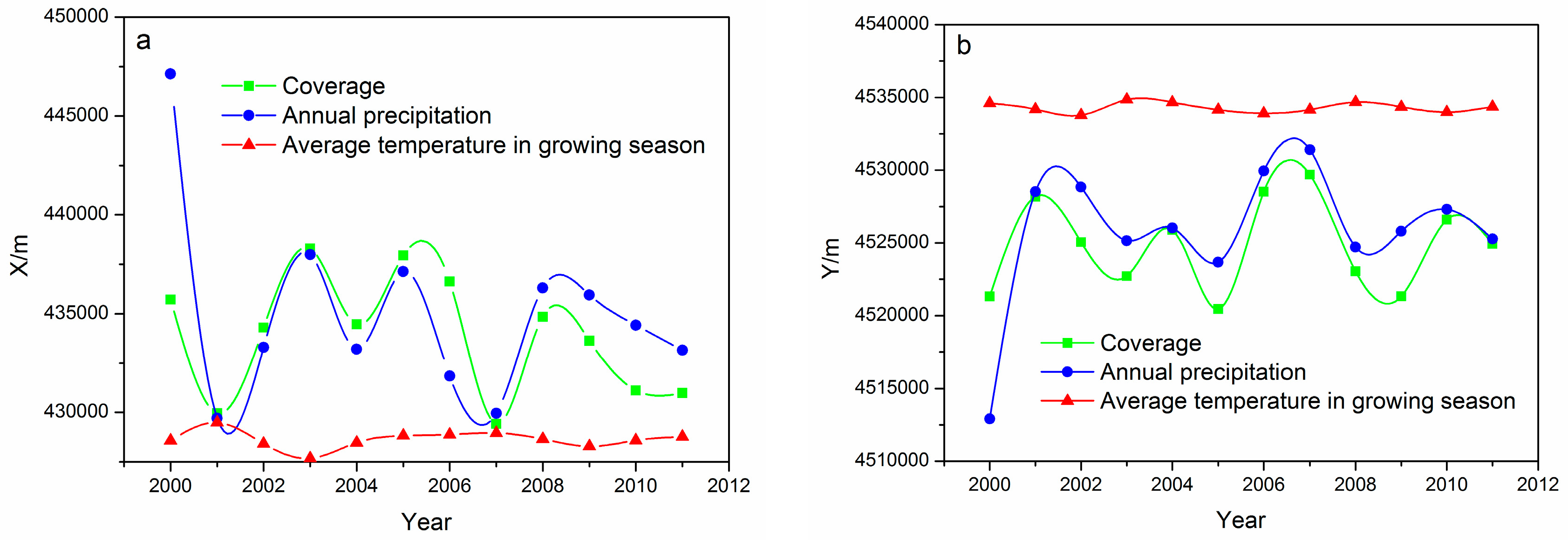
| Weather Station | RE/% | |
|---|---|---|
| Monthly Precipitation | Annual Precipitation | |
| Bailingmiao | 6.3 | 2.7 |
| Mandula | −5.6 | 3.6 |
| Classification | Standard and Description |
|---|---|
| High VFC grassland | Natural and improved grassland with a VFC > 50%, characterized by good growth conditions, and dense grass. |
| Medium VFC grassland | Natural and improved grassland with a VFC 30–50%, characterized by general growth conditions, sparse grass, and partial visible bare soil. |
| Low VFC grassland | Natural grassland with a VFC < 30%, characterized by poor growth conditions, obviously sparse grass and apparent bare soil. |
| Period | Precipitation (mm) | Proportion (%) | Correlation Coefficient |
|---|---|---|---|
| Non-growing season | 18.99 | 8.6 | 0.79 |
| April | 48.78 | 3.3 | 0.47 |
| May | 48.22 | 8.5 | 0.38 |
| June | 10.60 | 16.7 | 0.7 |
| July | 36.70 | 22.2 | 0.78 |
| August | 30.60 | 21.9 | 0.75 |
| September | 7.33 | 13.9 | 0.65 |
| October | 18.63 | 4.8 | 0.75 |
| Annual | 219.85 | 100 | 0.8 |
| Period | Correlation Coefficient |
|---|---|
| Annual accumulated temperature ≥ 10 °C | −0.36 |
| April | −0.62 |
| May | −0.68 |
| June | −0.71 |
| July | −0.78 |
| August | −0.82 |
| September | −0.77 |
| October | −0.58 |
| Growing season | −0.76 |
© 2017 by the authors. Licensee MDPI, Basel, Switzerland. This article is an open access article distributed under the terms and conditions of the Creative Commons Attribution (CC BY) license (http://creativecommons.org/licenses/by/4.0/).
Share and Cite
Song, Y.; Guo, Z.; Lu, Y.; Yan, D.; Liao, Z.; Liu, H.; Cui, Y. Pixel-Level Spatiotemporal Analyses of Vegetation Fractional Coverage Variation and Its Influential Factors in a Desert Steppe: A Case Study in Inner Mongolia, China. Water 2017, 9, 478. https://doi.org/10.3390/w9070478
Song Y, Guo Z, Lu Y, Yan D, Liao Z, Liu H, Cui Y. Pixel-Level Spatiotemporal Analyses of Vegetation Fractional Coverage Variation and Its Influential Factors in a Desert Steppe: A Case Study in Inner Mongolia, China. Water. 2017; 9(7):478. https://doi.org/10.3390/w9070478
Chicago/Turabian StyleSong, Yifan, Zhongxiao Guo, Yajing Lu, Denghua Yan, Zilong Liao, Huiwen Liu, and Yingjie Cui. 2017. "Pixel-Level Spatiotemporal Analyses of Vegetation Fractional Coverage Variation and Its Influential Factors in a Desert Steppe: A Case Study in Inner Mongolia, China" Water 9, no. 7: 478. https://doi.org/10.3390/w9070478
APA StyleSong, Y., Guo, Z., Lu, Y., Yan, D., Liao, Z., Liu, H., & Cui, Y. (2017). Pixel-Level Spatiotemporal Analyses of Vegetation Fractional Coverage Variation and Its Influential Factors in a Desert Steppe: A Case Study in Inner Mongolia, China. Water, 9(7), 478. https://doi.org/10.3390/w9070478




